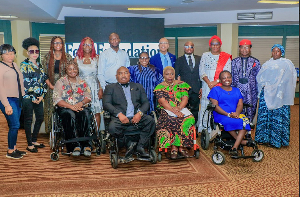Nigeria passed the Discrimination against Persons with Disabilities (Prohibition) Act in 2018 after over a decade of advocacy and lobbying but six years into the implementation of the Act, disability rights groups are dissatisfied with the progress.
In a recent panel discussion organized by the Center for the Right to Health and the Ford Foundation, people living with disabilities shared their personal frustration with the misconceptions, stigmatization, and barriers that prevent them from living a full and fulfilled life.
They highlighted how persons with disabilities are denied access to education, health care, and other amenities and often pitied, viewed as incapable, and their sexuality, desires, and intellect disregarded, while some have to endure abuse by their caregivers.
Dr. Stella Iwuagwu, Executive Director, of the Center for the Right to Health (CRH), a spinal cord injury survivor who shared these realities said the main reason is “we are seen as less of in the eyes of society and therefore do not deserve a full life like any other person”.
Reinforcing the societal disregard for persons living with disabilities, Theophilus Odaudu, a Programme Officer at Disability Rights Fund recounted the stigma his able-bodied wife faced when she accepted his marriage proposal. “A relative asked my wife, I hear you are getting married to a blind man, she said yes. Are you ready to live all your life taking care of somebody? But my wife told her I’ve been dating him and I’ve not been taking care of him. We have been married for 10 years now”.
Theophilus further pointed out how the lack of inclusivity, inadequate resources, and age restrictions limit the education and employment opportunities of persons living with disabilities. For instance, many special schools in Nigeria are situated miles away from where dwellers are, and lack the necessary study materials and professional teachers, often prolonging the period many persons with disabilities may use to complete their education, thus complicating access to jobs.
“There are age limits for a lot of job applications, and when they say nobody above the age of 24, for example, should apply for a role, most persons with disabilities are still in school at the age of 24. So, you see that we are cut out of a lot of these opportunities. I was able to acquire education because I have a father, who understood the intricacies of someone with a disability and had the resources to provide for my special needs.” said Theophilus.
The situation is further exacerbated by the harmful narratives of both global and local media, reinforcing and fueling existing notions and perceptions.
However, there is hope! Things are changing albeit slowly. Darren Walker, the President of Ford Foundation, who moderated the panel discussion, noted that the issue of disability rights and justice has become a very salient topic not only in Nigeria but globally. “Across the world, we are seeing a grassroots demand for accountability, rights, and justice for people living with disabilities, and it is about time.”
“Most of philanthropy and many donors are fixated on poverty alleviation, reducing inequality and injustice, with little or no work in empowering and supporting the leadership, rights, and development of people living with disabilities. We at the Ford Foundation, have been on our own journey in this regard and in recent years, we donors have done what was long overdue in acknowledging that there can be no justice without justice for people with disability,” said Mr. Walker.
To further improve things, participants discussed the need to work towards inclusive education, healthcare, and agriculture. Ekaete Umoh, Former Director, Global Disability Inclusion and Ford Foundation Fellow stated that by working across sectors, “we can acknowledge the diverse experiences within the disability community and harness it for development” and she believes it is the way to go if society will be successful at disrupting the kind of inequalities that exists.
To Rasak Adekoya, Disability Inclusion, and Development Consultant, this disruption also means it is time to redefine existing notions and perceptions by creating an inclusive media that narrates stories of persons living with disabilities without prejudice.
Regional News of Friday, 5 July 2024
Source: Ford Foundation
'No justice without justice for people with disabilities' - Darren Walker, Ford Foundation President
Entertainment
















